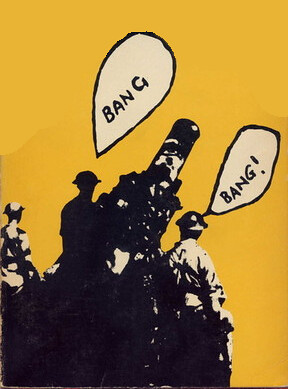 From QJRMS (paywalled), in which the Director & the Chief Computer of the British Rainfall Organization discussed the then-recent wet winter of 1914-5:
From QJRMS (paywalled), in which the Director & the Chief Computer of the British Rainfall Organization discussed the then-recent wet winter of 1914-5:
The year 1903 saw the general adoption of wireless telegraphy, and an anxious public seized upon this as the cause of the great rainfall of that year. But the fact that 1872 and 1853 were equally wet, if not wetter, without the aid of Hertzien waves, and that no year since 1903 has been nearly so wet in spite of the enormous increase of radio-telegraphy, shows the fallacy of the inference
An explanation which has been most readily accepted by the general public, and has even found favour among a few meteorologists, is that the heavy artillery firing in France and in Flanders is the primary cause of the unusual wetness of the past winter. There are several lines of argument. The crudest is that the water vapour formed by the combustion of cordite or other explosive is sufficient in quantity to affect the rainfall appreciably, but a moment's consideration of the staggering weight of water in even a moderate shower over a small area disposes of this absurdity. A more reasonable argument is that it is the concussion caused by high explosives which determines the precipitation of rain from supersaturated air. Here again the difficulty arises that if concussion is the cause, precipitation must occur immediately and presumably over the area within sound of the explosions. That at least is the principle on which people who try to induce public bodies to cannonade for rain have always gone. The dryness of September, October, March, and April, however, are difficult to explain on this hypothesis.
The real argument which seems to have weight with the type of mind which must have an immediate cause for any remarkable occurrence is that the rainfall of last winter was unprecedented, that the consumption of explosives in Western Europe was simultaneous and also unprecedented, and that two unprecedented things occurring at the same time must be related as cause and effect. Apart from the disparity of magnitude of the two sets of unprecedented phenomena, the fact that nearly equally wet periods occurred 3 and 38 years ago without any unusual consumption of explosives shows that such an explanation is not necessary to account for phenomena which can occur, and have occurred, in its absence.
It seems to us that the phenomena of long-continued wet spells in parts of the British Isles must be related, not to phenomena of the order of magnitude that comes within the range of human power, but to world-wide relationships, which increase the number or modify the course of the air-currents and atmospheric depressions of the North Atlantic; and it appears more hopeful to look for an explanation to these atmospheric surgings, which appear to give rise to oscillations between the pressure distribution in the northern and southern hemispheres, and which may possibly be associated with extra-terrestrial changes.

Sorry, I don't believe anything concerning climate research which is just output from a computer, chief or otherwise.
"Sorry, I don’t believe anything concerning climate research which is just output from a computer, chief or otherwise."
How about weather? Or is that verboten, as well?
Re graphic: Milligan?
Sufficiently complex computation is indistinguishable from magic
I knew it: aliens.
The sky is always falling so you really only need one event to cause it. CO2, deforestation, ozone, sunspots, dinosaur extinction, rising oceans, rising land, reforestation, solar panels, wind turbines, nuclear radiation, vaccines, lunar landings and bovine steroids. They all make the sky fall. Just depends on the flavor of the month.
b_nichol - How about weather? Or is that verboten, as well?
If we can't forecast tomorrow's weather with 100% accuracy, how can we forecast the weather in 1914 when it's already happened?
At the time, how well did the general public in England understand that weather systems at mid latitudes normally move west to east? I'm sure that meteorologists and people in the shipping business should have known by then, as the practice of taking shipboard weather observations and reporting them to a central bureau was several decades old by then, and anybody who knew this would have realized at once that exploding ordnance in France was unlikely to cause bad weather in Britain. And of course anybody in middle latitudes who has seen a TV weather forecast would know. But would the general public have known in 1915?
The idea that exploding ordnance could affect weather patterns isn't completely absurd. Nuclear winter, for instance. But it takes lots of explosive power to do this. World War II might have been enough (global average temperatures from 1940 to 1970 were flat or slightly declining). World War I was not.
[Nuclear winter isn't caused by the explosive power; its caused by the lofted aerosol -W]
The headline states ....
"Two unprecedented things occurring at the same time must be related as cause and effect"
But this is the classic non-sequitur surely !
I didn't think it worth actually reading the article after that.
[You should read the article. It nicely demolishes the headline, which was the point -W]
Mr Connolley, you have become a parody of your own persona, and I would urge you to get a real life, before it is too late. This isn't a dress rehearsal.
[Dr. And: perhaps you should try actually reading things before commenting on them? -W]
Cause and effect is easy to find when you are looking for anything. Its like the old con of betting someone that within 30 people 2 will have the same birthday.
"If we can’t forecast tomorrow’s weather with 100% accuracy"
Google Play Store has the Met Office app for free download. It's bang on, 24 hours in advance. Enter your postcode and give it a whirl.